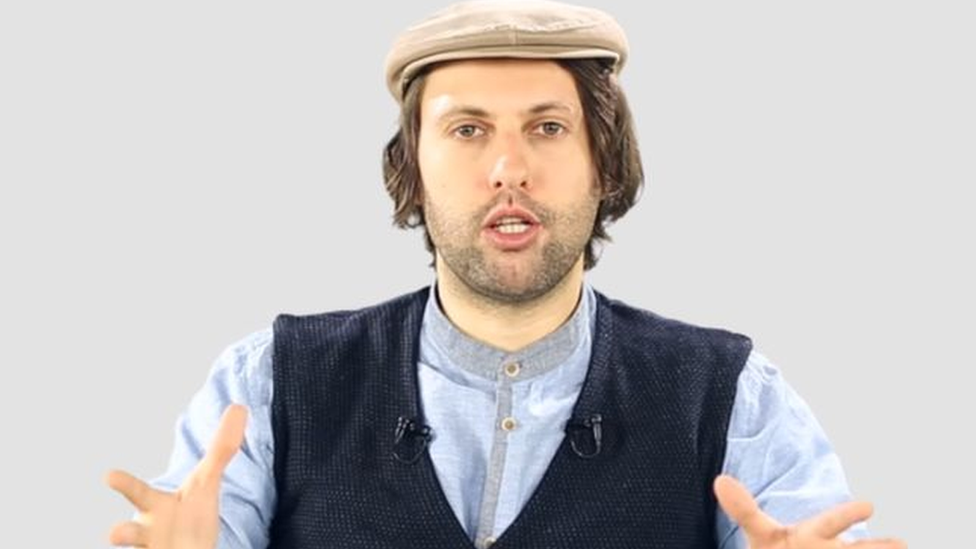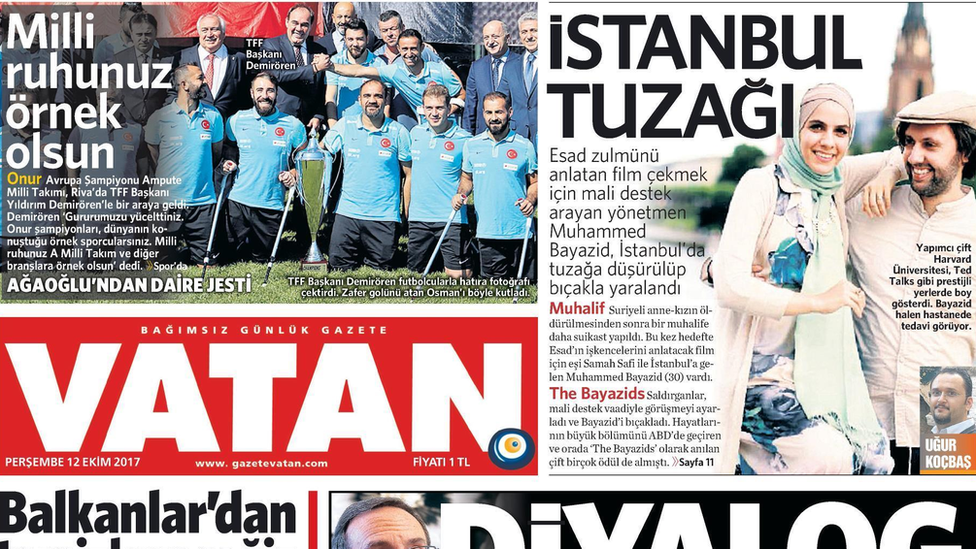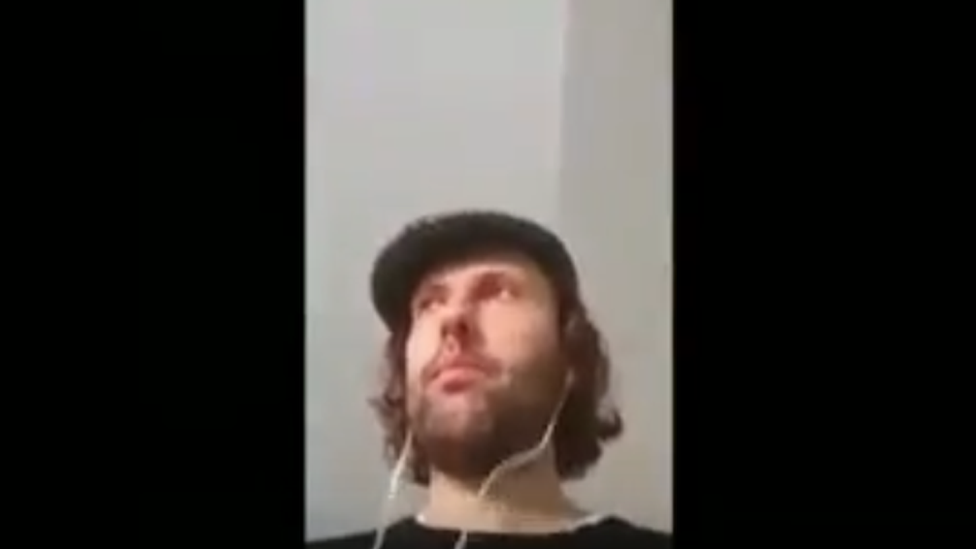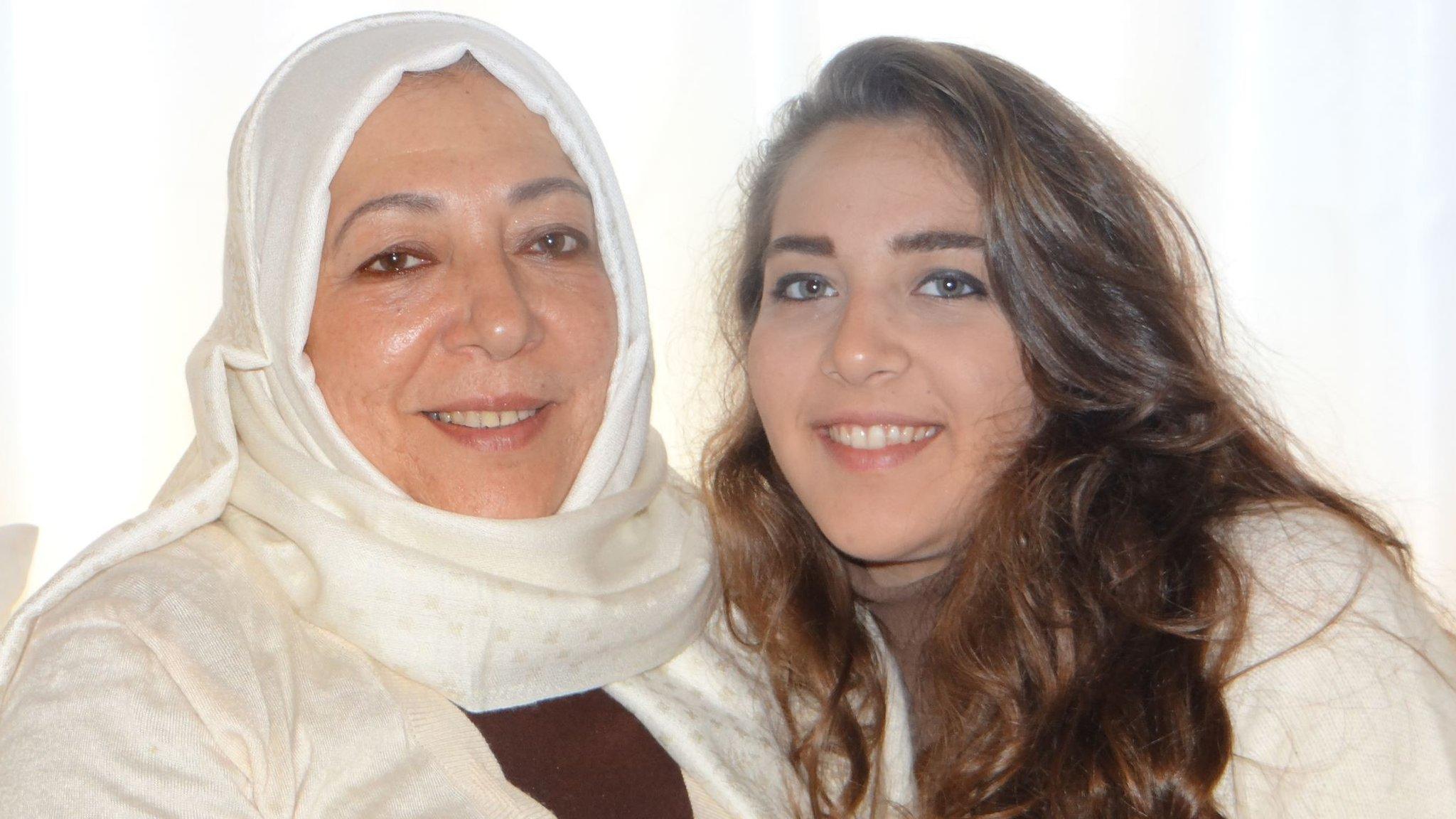Online anger over Syrian filmmaker 'stabbed' in Turkey
- Published

Some Twitter users have used the hashtag #I_call_for_the_trial_of_Bayazid
Social media users have been hotly debating whether an alleged assassination attempt on a Syrian filmmaker was a hoax.
Users are asking whether US-based Syrian filmmaker Muhammad Bayazid, who says he was stabbed in Istanbul on 10 October, faked the attack to gain funding for an anti-Syrian government film that he had been working on.
The filmmaker denies these allegations.
What was the original story?

The incident made headlines in Turkish newspapers (R)
Muhammad Bayazid was reportedly "stabbed" in what his wife described as an "assassination attempt".
The filmmaker was said to have been lightly injured in the shoulder and was taken to a nearby hospital.
The alleged perpetrator was a Syrian businessman who was interested in funding Mr Bayazid's film - The Tunnel, a documentary about one of Syria's most notorious prisons in the eastern city of Palmyra. He apparently requested to meet Mr Bayazid on the day of the stabbing to discuss the project.
Syrian pro-opposition users speculated that the businessman was linked to the Syrian government, leading people to express deep distress and concern over the incident, especially as many opposition activists reside in Turkey.
The news of the stabbing of Mr Bayazid was widely covered on local, regional and international media outlets, including the BBC. It came a few days after an opposition figure and her journalist daughter were murdered in Istanbul.
A few days after the alleged incident, Turkish newspaper Hurriyet said that Mr Bayazid had provided police with the details of what happened, noting that he left for the US 18 hours later.
After a picture appeared showing Mr Bayazid with a friend arriving in Washington hours after the alleged attack, Syrian social media users began to poke holes in the story, presenting the possibility that the incident could have been faked.
What happened next?

Video purporting to show Mr Bayazid discussing an assassination attempt against him has been widely circulated online
The London-based pan-Arab Al-Araby al-Jadeed news website republished leaked videos in a report published on 1 November showing Mr Bayazid speaking on the phone with a friend and purportedly planning his own fake assassination attempt. The videos reportedly date back to May and June 2017.
Al-Araby said that Mr Bayazid lured a freelance media producer called Mohammed al-Hindy into helping him plan the incident.
Although Mr Bayazid was reportedly stabbed in the attack, the videos discuss the use of a firearm.
When in one of the videos, the producer asks about the obstacles that he could face when acquiring a firearm in Turkey, Mr Bayazid urges him to refer to the weapon as "the camera" in the phone calls.
Mr Bayazid also allegedly created a fake social media account for the would-be attacker months before the incident.
Why fake his own assassination?
According to Al-Araby al-Jadeed's report, Mr Bayazid's main aim was to generate a "buzz" about the incident that would be turned into "action" - to have people donate and support his film.
"When this happens, for 48 hours, you and I will become the most famous people in the Middle East. Every news outlet will talk about it; every channel; the whole world will talk about it," he says in another video. He tells Mohammed al-Hindy that he should not be surprised if CNN or Al-Jazeera TV contact him.
He says he does not care much about the media attention as much as using it to have people support his film financially.
What does Mr Bayazid say about the videos?
Mr Bayazid denied faking the attack in a lengthy post on his Facebook page on 1 November, saying that the leaked videos were of conversations he had with Mr Hindy after the incident.
According to Mr Bayazid, he was discussing the scenario of a film he was planning to make about his experience.
Mr Bayazid accused Mr Hindy of editing clips of the videos of the phone calls.
He also noted that he was volunteering to make The Tunnel and pointed out that he had suffered "huge losses" after the incident - both financially and emotionally - as a primary sponsor had withdrawn from the project.
On 26 October, the filmmaker published a small clip of a film called "Camera" that he said he had been working on. The film allegedly tells the story of what happened to him and other journalists. He noted that it was produced by a group of "his friends, as a gift".
His wife, Samah, told UK newspaper Guardian, external that the couple had been subjected to online abuse, and insisted the attack was genuine.
"My husband has not only faced a physical assassination attempt, but he has been facing a continuous character assassination from the very next day til now," she said.
The filmmaker appears to have closed down his pages on Facebook and Twitter as of 3 November.
How did Syrians react?
The story stirred commentary by Syrian users on Twitter and Facebook.
Some of his supporters and followers online believed Mr Bayazid's account.
But many other Syrian users condemned him and called for him to face legal action using an Arabic hashtag meaning "I call for the trial of Bayazid".
Opposition journalist and writer Ahmad Aba Zaid tweeted: "I have not written anything on Muhammad Bayazid. But after the exposure of the lies and the cheap manipulation of people's emotions and the Syrian cause for money and personal fame: I call for the trial of Bayazid."
Osama Abu Zeid, the legal advisor to the rebel Free Syrian Army (FSA), used the hashtag, tweeting that there was "no limit to the dirtiness" that was exposed by Al-Araby al-Jadeed.
BBC Monitoring, external reports and analyses news from TV, radio, web and print media around the world. You can follow BBC Monitoring on Twitter, externaland Facebook, external.
- Published22 September 2017

- Published2 May 2023

- Published4 November 2017